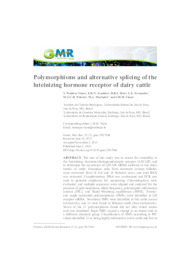Polymorphisms and alternative splicing of the luteinizing hormone receptor of dairy cattle.
Polymorphisms and alternative splicing of the luteinizing hormone receptor of dairy cattle.
Author(s): WOHLRES-VIANA, S.; ARASHIRO, E. K. N.; REIS, D. R. de L.; FERNANDES, L. E.; PEIXOTO, M. G. C. D.; MACHADO, M. A.; VIANA, J. H. M.
Summary: Abstract The aim of this study was to screen for variability in the luteinizing hormone/choriogonadotropin receptor (LHCGR) and to determine the occurrence of LHCGR mRNA isoforms in two dairy breeds of cattle. Granulosa cells from dominant ovarian follicles were recovered from 16 Gir and 16 Holstein cows, and total RNA was extracted. Complementary DNA was synthesized and PCR was used to generate amplicons for sequencing. Chromatograms were evaluated, and multiple sequences were aligned and analyzed for the presence of polymorphisms, allele frequency, polymorphic information content (PIC), and Hardy-Weinberg equilibrium (HWE). Twentyone single nucleotide polymorphisms (SNPs) were identified in LH receptor mRNA. Seventeen SNPs were identified in Gir cattle (seven exclusively), and 14 were found in Holstein cattle (four exclusively). Seven of the 21 polymorphisms found did not alter which amino acid was translated. Eight SNPs caused a change to an amino acid in a different chemical group. Classification of SNPs according to PIC values identified 12 as being highly informative in Gir cattle and five in Holstein. Eight SNPs deviated from HWE in Gir compared with 11 in Holstein, and eight in both breeds. Two isoforms were also identified, one in exon 1, which lacks 30 nucleotides beginning at position 118, and the other in exon 10. Taken together, these data show that LHCGR in dairy cattle breeds has a high frequency of polymorphism and exists in multiple isoforms resulting from alternative splicing.
Publication year: 2016
Types of publication: Journal article
Unit: Embrapa Dairy Cattle
Keywords: LHCGR isoforms, reproduction, zebu
Observation
Some of Embrapa's publications are published as ePub files. To read them, use or download one of the following free software options to your computer or mobile device. Android: Google Play Books; IOS: iBooks; Windows and Linux: Calibre.
Access other publications
Access the Agricultural Research Database (BDPA) to consult Embrapa's full library collection and records.
Visit Embrapa Bookstore to purchase books and other publications sold by Embrapa.

